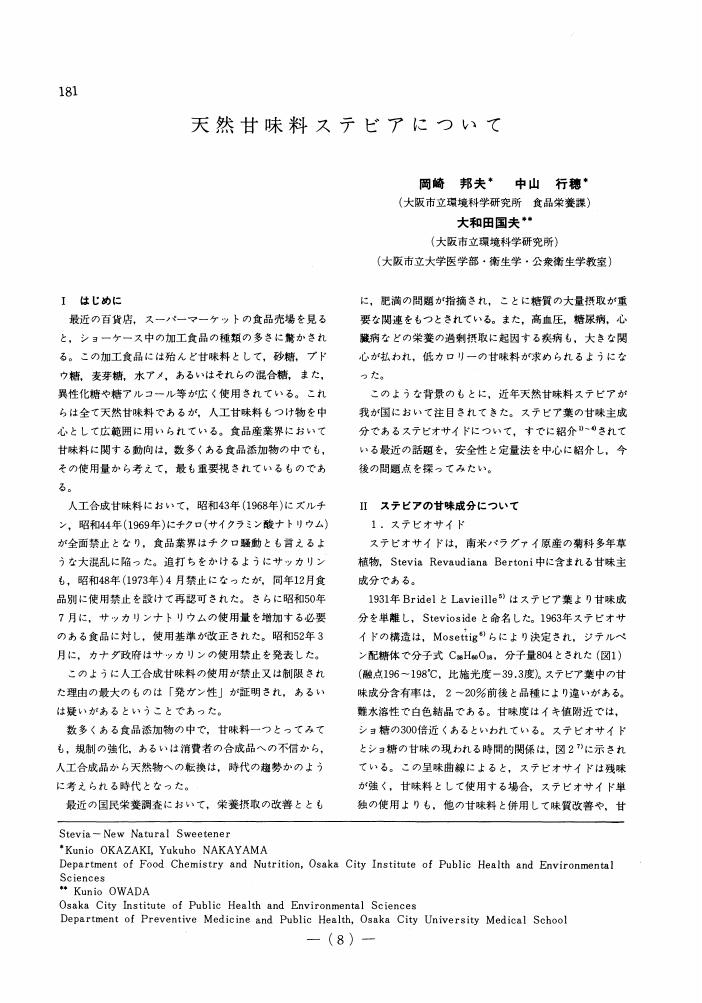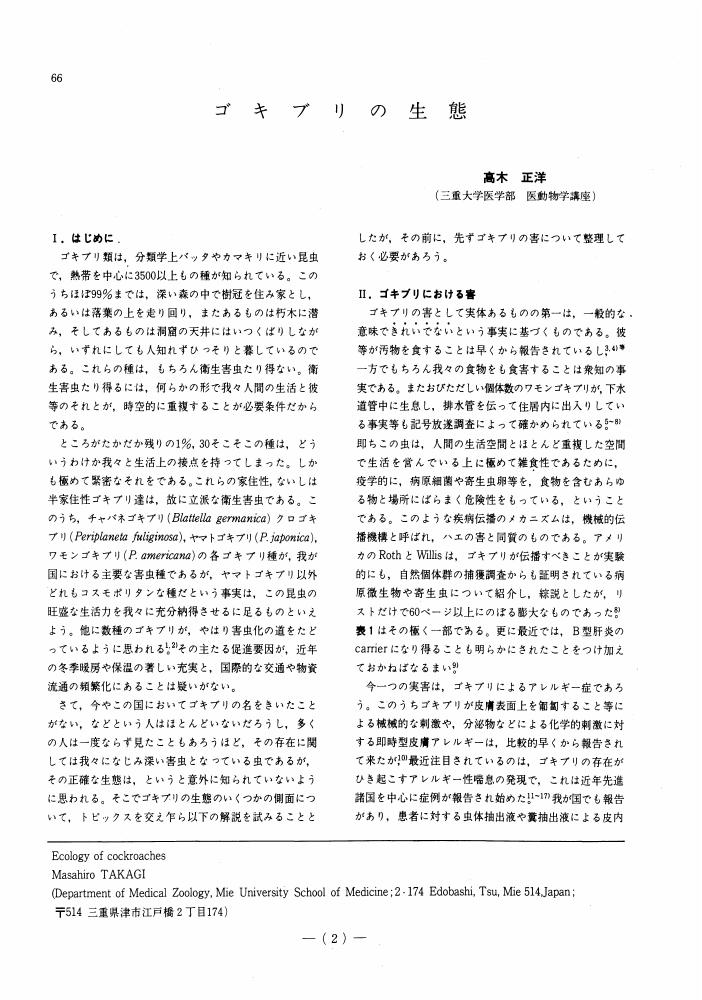2 0 0 0 OA 天然甘味料ステビアについて
- 著者
- 岡崎 邦夫 中山 行穂 大和田 国夫
- 出版者
- Osaka Urban Living and Health Association
- 雑誌
- 生活衛生 (ISSN:05824176)
- 巻号頁・発行日
- vol.21, no.6, pp.181-185, 1977-12-20 (Released:2010-03-11)
- 参考文献数
- 24
2 0 0 0 OA 金属と生体
- 著者
- 森田 茂
- 出版者
- Osaka Urban Living and Health Association
- 雑誌
- 生活衛生 (ISSN:05824176)
- 巻号頁・発行日
- vol.31, no.2, pp.64-80, 1987-03-10 (Released:2010-03-11)
- 参考文献数
- 61
- 著者
- 竹村 浩 塩谷 順彦 小森 美加 陶 易王
- 出版者
- Osaka Urban Living and Health Association
- 雑誌
- 生活衛生 (ISSN:05824176)
- 巻号頁・発行日
- vol.53, no.1, pp.11-18, 2009-01-30 (Released:2009-02-09)
- 参考文献数
- 12
- 被引用文献数
- 1
To evaluate the effects of natto fermented by Bacillus subtilis MC1 on defecation, fecal properties and fecal microflora, a crossover study was conducted in 44 healthy volunteers (female, 34.9±8.8 years old; mean±SD). The subjects were divided into two groups and given 40g natto (B.subtilis MC1 spores 2×1010cfu) and boiled soybeans (40g/day) for 14 days each. No effect of natto was found on the frequency of defecation, the volume of feces or fecal characteristics. The number of Bacillus bacteria was significantly increased after the natto administration period in comparison with the boiled soybean administration period (p<0.05), indicating that live B.subtilis MC1 spores reached the large intestine. On the other hand, the number of other bacteria showed no change in the natto administration period in comparison with the boiled soybean administration period.
2 0 0 0 OA 環境教育の現代的形態としての持続可能な社会のための教育
- 著者
- 今井 長兵衛
- 出版者
- Osaka Urban Living and Health Association
- 雑誌
- 生活衛生 (ISSN:05824176)
- 巻号頁・発行日
- vol.50, no.6, pp.483-500, 2006 (Released:2006-12-07)
- 参考文献数
- 86
- 被引用文献数
- 1
Papers were reviewed in order to reveal the developmental process of the environmental education concept from the Stockholm Declaration (1972) to the United Nations Decade of Education for Sustainable Development (2005-2014) and to clarify the principle of education for sustainable society as a current phase of environmental education. Among the many issues, the author emphasizes the need for education on local environmental pollution, awareness of the assailant versus sufferer relationships in every environmental problem, participation in action and movements against global environmental crisis, and global partnerships between assailants, mostly in ‘developed’ countries, and sufferers, mainly in ‘developing’ countries, against economic globalization. The urgent goals of education for sustainable society are considered to be the eradication of poverty, diseases, violence, discrimination, and social injustice in ‘developing’ countries, most of which have been caused by globalization and the ‘developed’ countries. The conventional environmental ethic is considered as a combination of the inter-generation ethic and the space ship ethic. The former says that the present generation is the assailant of the future generation while the latter states that all people on earth are equally crew members of the earth as a space ship. These two ethics ignore the existence of assailants and sufferers in both present and future generations and place the sufferers in the present generation under a false charge as assailants of the future generation. A new environmental ethic should be established on the basis of the inter-generation ethic and an alternative to the space ship ethic, namely the inter-area ethic that declares the existence of assailants and sufferers in both present and future generations.
2 0 0 0 OA ゴキブリの生態
- 著者
- 高木 正洋
- 出版者
- Osaka Urban Living and Health Association
- 雑誌
- 生活衛生 (ISSN:05824176)
- 巻号頁・発行日
- vol.29, no.2, pp.66-78, 1985-03-10 (Released:2010-03-11)
- 参考文献数
- 49
- 被引用文献数
- 2
2 0 0 0 OA 食品を介した寄生虫病
- 著者
- 阿部 仁一郎
- 出版者
- Osaka Urban Living and Health Association
- 雑誌
- 生活衛生 (ISSN:05824176)
- 巻号頁・発行日
- vol.44, no.4, pp.163-170, 2000-07-30 (Released:2010-03-11)
- 参考文献数
- 26
2 0 0 0 OA 喫煙環境中におけるアセトアルデヒド、ホルムアルデヒド濃度
- 著者
- 宮崎 竹二
- 出版者
- Osaka Urban Living and Health Association
- 雑誌
- 生活衛生 (ISSN:05824176)
- 巻号頁・発行日
- vol.48, no.4, pp.181-190, 2004 (Released:2005-01-27)
- 参考文献数
- 15
- 被引用文献数
- 4
Concentrations of formaldehyde, acetaldehyde, acetone and acrolein were measured, in addition to dust concentrations, at smoking rooms, smoking corners of the stations and several other places where smoking was permitted. Dust concentration was 0.439 mg/m3, formaldehyde concentration 46.0 μg/m3 and acetaldehyde concentration 101.7 μg/m3 at smoking room A where a ventilation fan was in operation. Dust concentration was 0.288 mg/m3, formaldehyde concentration 71.6 μg/m3 and acetaldehyde concentration 121.7 μg/m3 at smoking room B where an air purifier was in operation. Ratios of formaldehyde, acetaldehyde, acetone and acrolein concentrations to SPM concentration at smoking room A were 0.10, 0.18, 0.10 and 0.013, respectively. Ratios at smoking room B higher than those at smoking room A because although the air purifier could remove dust, it could not completely remove formaldehyde and acetaldehyde.
2 0 0 0 橋の向こうに見える景色:私の健康手帳
- 著者
- 山幡 一雄
- 出版者
- Osaka Urban Living and Health Association
- 雑誌
- 生活衛生 (ISSN:05824176)
- 巻号頁・発行日
- vol.45, no.1, pp.39-41, 2001
2 0 0 0 OA 食品衛生上からみた器具, 容器・包装の諸問題
- 著者
- 山田 明男
- 出版者
- Osaka Urban Living and Health Association
- 雑誌
- 生活衛生 (ISSN:05824176)
- 巻号頁・発行日
- vol.31, no.3, pp.125-148, 1987-05-10 (Released:2010-03-11)
- 参考文献数
- 70
2 0 0 0 OA 洗濯機内部に生育するカビと洗剤成分の関係
- 著者
- 濱田 信夫
- 出版者
- Osaka Urban Living and Health Association
- 雑誌
- 生活衛生 (ISSN:05824176)
- 巻号頁・発行日
- vol.49, no.3, pp.161-167, 2005 (Released:2005-06-07)
- 参考文献数
- 11
- 被引用文献数
- 2
Eight varieties of fungus were cultured on various media containing different surfactants and their rates of growth compared. All eight fungi grew on media containing sodium oleate, a sodium fatty acid used in soap, and some species of Scolecobasidium, Exophiala and Torula also grew on media containing AE, a non-ionic surfactant used in synthetic detergent. Unlike the other fungi, Scolecobasidium grew faster on media containing AE than on that containing sodium oleate. Similarly, unlike in washing machines using soap, Scolecobasidium was dominant in washing machines using synthetic detergent. On the other hand, all 8 fungi grew on media containing 0.01% of the anionic surfactants LAS or ABS. The fungal flora of washing machines using synthetic detergent was therefore thought to be determined by non-ionic surfactant and not by anionic surfactant.
2 0 0 0 OA 洗濯機内部に生育するカビの特性
- 著者
- 濱田 信夫
- 出版者
- Osaka Urban Living and Health Association
- 雑誌
- 生活衛生 (ISSN:05824176)
- 巻号頁・発行日
- vol.49, no.2, pp.108-113, 2005 (Released:2005-04-08)
- 参考文献数
- 11
- 被引用文献数
- 9
Four kinds of fungi were cultured on various media, including different surfactants, and their growth was compared. Cladosporium cladosporioides and Aureobasidium sp., which are common fungi in indoor environments, were inhibited by detergents, especially synthetic detergent. On the other hand, Scolecobasidium sp. and Exophiala alcalophila, the dominant varieties inside washing machines, were not inhibited. Moreover, growth of the latter two fungi was promoted even on media containing 0.25% of detergent. Scolecobasidium sp. and E. alcalophila are thought to utilize detergent as a nutrient, and to be adapted to the environmental conditions inside washing machines.
2 0 0 0 OA アメーバの生息環境とレジオネラ感染症
- 著者
- 石井 営次
- 出版者
- Osaka Urban Living and Health Association
- 雑誌
- 生活衛生 (ISSN:05824176)
- 巻号頁・発行日
- vol.47, no.6, pp.320-327, 2003-11-30 (Released:2010-03-11)
- 参考文献数
- 41
2 0 0 0 OA 着色料規制法令の変遷とその考察 (第1報) 明治・大正・昭和初期の規制
- 著者
- 清水 孝重 村井 浩 藤井 正美
- 出版者
- Osaka Urban Living and Health Association
- 雑誌
- 生活衛生 (ISSN:05824176)
- 巻号頁・発行日
- vol.38, no.3, pp.109-114, 1994-05-30 (Released:2010-03-11)
- 参考文献数
- 21
The authors reviewed the trnasition of coloring matter regulations in Japan.In the latter half of the 19th century synthetic coloring matters began to be used for coloring food both Western countries and Japan. Coloring matter regulations started to be enforced in these countries at around the same time.In 1900 the Regulations for the Control of Harmful Coloring Matters were enacted in Japan. They listed harmful coloring not to be used for coloring food.The official seal system for synthetic coloring commenced in 1941. Containers of synthetic coloring products which had passed the inspections conducted at the National Hygiene Laboratory were sealed with the official certificate seals.Since the above-mentioned regulations prohibited the use of the harmful coloring matters listed, the government did not have a legal basis to forbid the use of other harmful coloring maters until the enactment of the Food Sanitation Law in 1947.
2 0 0 0 プラズマクラスターイオンによる除菌作用の原理と応用
- 著者
- 中村 美咲 西川 和男
- 出版者
- Osaka Urban Living and Health Association
- 雑誌
- 生活衛生 (ISSN:05824176)
- 巻号頁・発行日
- vol.53, no.4, pp.239-246, 2009
- 被引用文献数
- 1
We have developed a discharge plasma air-cleaning technology known as PlasmaCluster IonR (PCI), which generates both positive and negative ions in the air. The present study was designed to determine the mechanism of the ions' effect on bacteria. We confirmed that PCI destroys the surface of airborne and attached bacteria. The present paper reports the principle of PCI and the results of examination of its bactericidal effect. We also show how the device produces cluster ions from a specially designed discharge electrode and investigate what types of ion are detected in mass-spectroscopy analysis.
2 0 0 0 OA 水道法に基づく水質基準の改正
- 著者
- 飯田 才一
- 出版者
- Osaka Urban Living and Health Association
- 雑誌
- 生活衛生 (ISSN:05824176)
- 巻号頁・発行日
- vol.23, no.3, pp.96-101, 1979-06-20 (Released:2010-03-11)
- 参考文献数
- 7
2 0 0 0 OA 食品及び住環境のカビ対策入門
- 著者
- 濱田 信夫
- 出版者
- Osaka Urban Living and Health Association
- 雑誌
- 生活衛生 (ISSN:05824176)
- 巻号頁・発行日
- vol.33, no.6, pp.237-246, 1989-11-10 (Released:2010-03-11)
- 参考文献数
- 8
2 0 0 0 夏宵禮讃二題:寳石の雨降る流れ星と天空の爆撃隊花火の話
- 著者
- 岡藤 次郎
- 出版者
- Osaka Urban Living and Health Association
- 雑誌
- 家事と衛生 (ISSN:18836615)
- 巻号頁・発行日
- vol.9, no.8, pp.67-71, 1933
2 0 0 0 凡さんの生活科学
- 著者
- 鶴 秀茂
- 出版者
- Osaka Urban Living and Health Association
- 雑誌
- 生活科学 (ISSN:18836623)
- 巻号頁・発行日
- vol.7, no.1, pp.26-29, 1955
- 著者
- 小田 国雄 福永 勲 土永 恒弥 宇野 源太 石井 隆一郎
- 出版者
- Osaka Urban Living and Health Association
- 雑誌
- 生活衛生 (ISSN:05824176)
- 巻号頁・発行日
- vol.15, no.4, pp.123-129, 1971
2 0 0 0 大阪市の騒音について (1)
- 著者
- 庄司 光
- 出版者
- Osaka Urban Living and Health Association
- 雑誌
- 生活衛生 (ISSN:05824176)
- 巻号頁・発行日
- vol.2, no.1, pp.16-20, 1958
1957月12月19日の大阪の大阪市会の決算委員会の席上で寺西議員は中井市長に「都市の騒音防止条例をつくる意志あるか」と質問しているのに対して, 中井市長は「騒音防止も外国の都市では道路が整備され, 乗物の種類が大阪は複雑でないから静かにできるので大阪では困難だとの考えもあるが, 私は大阪でもできると思う。しかしこれは取締警察と取締られる運輸関係者などの声をよくきいた上で結論を出したい。」と答えている。(昭和32年12月20日大朝日新聞)。現在までに騒音防止条例を制定している都市は12市, 1県に及んでいる。大阪市の騒音はどのようなもか, 又何故大阪では騒音防止条例の制定がこのように遅れているのであろろうか。







